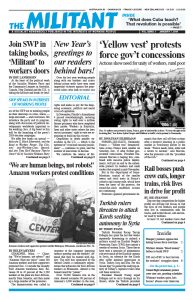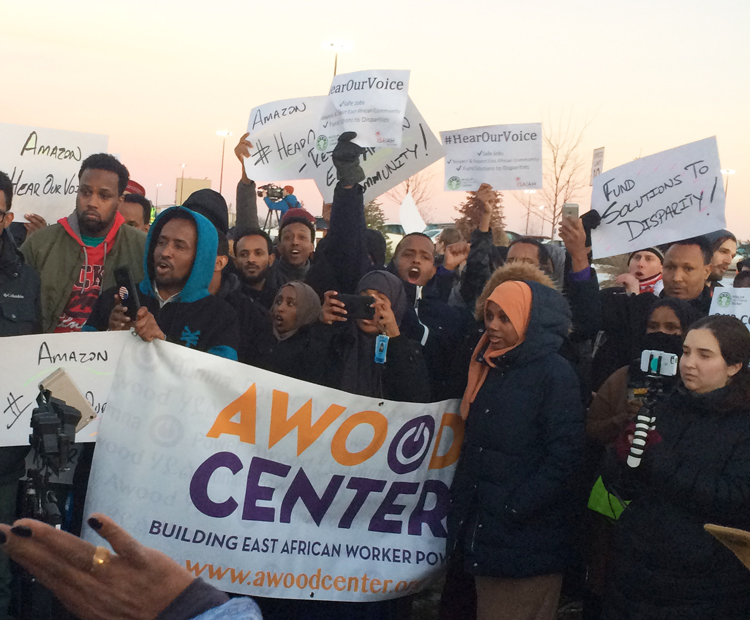SHAKOPEE, Minn. — Chanting “We’re humans, not robots!” and “Amazon: Hear our voice!” some 300 Amazon workers and their supporters protested Dec. 14 outside the recently built Amazon warehouse here. Between 30 to 45 percent of the 2,500 workers at the plant are East African, mostly from Somalia, and they made up a large number of the protesters.
The demonstration was called in response to the company imposing intense speedup and the workers’ demand that they be treated with dignity. The rally was sponsored by the Awood Center, a community organization that advocates for East African workers in Minnesota. Awood is the Somali word for “power.”
Over 70,000 Somalis live in the state. Awood estimates 60 percent of Amazon’s 3,000 workers in the area, including at other facilities, are East Africans.
Protesters cheered as about 40 workers walked off the job at 4 p.m., an hour before the end of their shift, and joined the rally. More workers joined after they clocked out.
“They don’t respect us. They want us to work like machines,” Amazon worker Hibaq Mohammad told the Militant. “They don’t respect our religion or our health. Ninety-eight percent of workers who get fired here are fired for not being fast enough. It’s unfair.”
Alamger Mohammad has worked at Amazon for 13 months. “I quit my old job thinking this would be better, but we are treated like animals, not humans,” he said.
Abdi Mohammed said, “They work people like robots, change the rate. It’s constant pressure. If you can’t keep up with the machines you get a warning. Three warnings and they fire you.”
While the majority of those who joined the protest were from Somalia, workers from Bangladesh, Mexico, Ethiopia and the United States also took part. A Mexican worker who walked out said they are all working 60 hours per week because of the Christmas holiday. “You get breaks but they count that against your rate,” he said.
The Service Employees International Union, the Communications Workers of America and a sizable delegation of Teamsters, wearing union jackets and hats supported the protest.
Several of the Amazon workers put on “Teamsters 120” hats. “We’re here to support the workers, and we want to see an organizing drive of Amazon workers nationwide,” Wayne Perleberg, a business agent for Teamsters Local 120, told the Militant.
A number of workers at the rally said they agreed that they needed to get a union.
One sign read, “Walmart workers support Amazon workers.” Four workers who came from a Walmart store in the Twin Cities area brought a solidarity card signed by 17 co-workers that was given to rally organizers.
The Dar Al Farooq Islamic Center in nearby Bloomington brought a busload of supporters. “People in our community are struggling and we’re here to give support,” high school student Nabira said.
Bosses disdain for workers’ needs
Khadra Kassim, who told the rally she has worked at the warehouse for a year and a half, said she almost had a miscarriage after lifting a heavy box and passing out. She went to the company health office for help, but was told that because she was new she wasn’t eligible for medical care. “Nobody called an ambulance, nobody even called my husband,” she said. “Thank God, my daughter survived.”
Workers who spoke raised the need for management to provide easier access to conduct prayers, for more Somali managers and other proposals they thought would cut across discrimination on the job.
Speakers included Ilhan Omar, just elected as the first Somali-American to Congress and Jaylani Hussein, executive director of the Minnesota chapter of the Council on American-Islamic Relations.
An information sheet distributed by Awood said the workers have been speaking out and protesting against injustices for months. Because of this, Amazon management met twice with a delegation of workers from three facilities, as well as drivers and truckers, together with local religious and civil rights leaders.
“Although respectful, Amazon management responded to our concerns by only wanting to solve small individual problems — and not change the BIG problems that impact us all,” the flyer said. “Some workers have been offered better jobs if they abandon their community — but they have refused!”
Amazon spokeswoman Shevaun Brown told the Shakopee Valley News the day of the rally that “the workers wouldn’t suffer repercussions for walking out Friday.” She also said that Amazon is looking to hire managers from the Cedar-Riverside community of Minneapolis, where many Somalis live.
At the end of the rally, protesters marched onto Amazon property. They chanted at the main entrance as workers inside the building lined the windows from the second-floor cafeteria to watch. Local, county and state police appeared within minutes to block the door. As they left, the workers chanted, “We will be back.”


